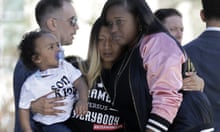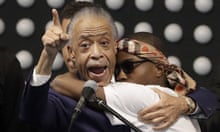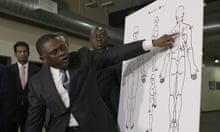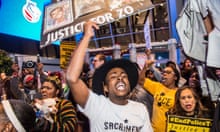“They gunned him down like a dog,” Stevante Clark said of the police shooting of his brother, Stephon. “They executed him.”
Stevante was in the back seat of a car, his voice quivering. He stomped his feet 20 times – one for each bullet that police fired at his unarmed brother.
“Twenty times. That’s like stepping on a roach. And then stepping, stepping, stepping, stepping, stepping, stepping, stepping.”
The killing of Stephon Clark on 18 March by Sacramento police has sparked outrage and massive protests in the Californian capital, drawing comparisons with other cases of law enforcement killing unarmed black people, such as Oscar Grant, Michael Brown and Eric Garner.
Stephon, an unarmed 22-year-old father of two, was standing in his grandmother’s back yard holding only his iPhone when officers, who did not announce they were police, appeared in the dark, shouted at him to reveal his hands and quickly fired a round of bullets at him before he could respond.
His brother, Stevante, 25, has been thrust into the national spotlight and forced to navigate media, protests, lawyers and donations while struggling through his own grief and anger.
“I shouldn’t have to defend my brother. They should be proving their innocence,” Stevante told the Guardian on Sunday night, during an interview in his friend’s car. “I’m exhausted. I hate this. I hate my life.”
At a time when debates about gun laws are dominating the news – surrounding the March for Our Lives rallies organized by Florida students – Clark’s death has served as a harsh reminder that law enforcement fatally shoot hundreds of Americans each year, many more than those who die in mass shootings.

For those mourning Stephon, police gun violence must not be forgotten. “Who polices the police?” said Darron Powe, a longtime family friend. “We need a voice.”
Sacramento police have said that officers were responding to calls of someone breaking into vehicles when they located Stephon. Body-camera footage showed police running in, shouting “Show me your hands!” and “Gun!” before shooting a rapid-fire succession of bullets at him less than 20 seconds after they arrived.
For five minutes, no officers approached Stephon or offered him medical aid, instead continuing to shout at him to show his hands. He was not moving. Officers eventually handcuffed his lifeless body. No weapon was in sight. Officers then muted the audio on their cameras.
Sequita Thompson, Stephon’s grandmother, was sitting in her dining room when she heard the “boom boom boom”, she said on Monday. Afraid of the bullets, she grabbed her seven-year-old granddaughter and they crawled to a bedroom.
Stephon, who went by the nickname Zoe, cared more about his two young sons, one and three, than anything in the world, his brother said. He also loved sneakers, dancing and making people smile. Stevante and Powe laughed Sunday night remembering some of Stephon’s favorite movie impressions – Chris Tucker in Rush Hour and Kevin Hart in Soul Plane.
Stevante said he was tired of summarizing his brother’s worth in a soundbite for the news. He also said he was fed up with reporters mentioning his brother’s previous run-ins with the law and jail time, as if his past challenges justified his killing.
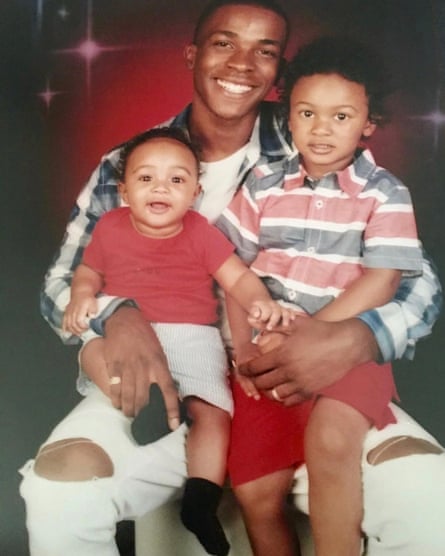
“Why aren’t we talking about the police’s mistakes?” he said. “My city is scared of police. I’m scared to live here. I don’t feel safe.”
“It doesn’t matter who he was or what he did,” added Luke Tailor, a 24-year-old friend of Stephon. “He’s a human. That in itself is enough to fight for.”
Like police forces in liberal states across the country, Sacramento’s department has previously adopted reforms in the wake of controversy. In 2016, officers tried to run over a homeless man with a police car before shooting him dead.
The Sacramento mayor, Darrell Steinberg, initially released a statement saying he would not “second-guess” the officers, prompting swift backlash. In an interview Monday, he said the videos made him feel “really sick” and that the outcome was “wrong”.
He said: “I really feel like this can be a moment for Sacramento and the country that shows another way is possible.”
He declined, however, to say whether he felt charges were warranted.
To some, Stephon’s killing suggests little progress has been made. And despite the undisputed disturbing facts of the case, experts have suggested that police could easily avoid convictions since they would only have to prove that they felt they were in danger.
“The chances of cops going to jail are very rare,” said Stevante, adding: “We’re not going to get justice, because my brother’s not coming back.”
Last week, protesters shut down freeways and blocked NBA fans from entering the arena of the Sacramento Kings. The Kings have expressed support for Stephon.

Looking at a photo of the stadium that remained largely empty due to protests, Stevante’s eyes welled with tears: “Stephon would be so proud. Stephon shut the whole place down.”
He said he appreciated the support for his brother in Sacramento, but was skeptical the story would get the attention it deserves at a national level.
Locally, Stevante said he wanted the tragedy to spark change and hoped to build a library in his brother’s honor while supporting other gun violence prevention efforts, such as breakfast programs and community centers.
Still, he said he did not think of himself as an “activist” or “leader” and struggled with the constant reminders of his brother’s death – people stopping him on the street, calls from reporters, social media postings. He’s avoided watching the police videos and many of the news reports.
It’s hard to find relief, he said, noting that he was still unable to feel comfortable in his family’s home where his brother died. “Where can you fucking go if you’re not safe at grandma’s house?”

